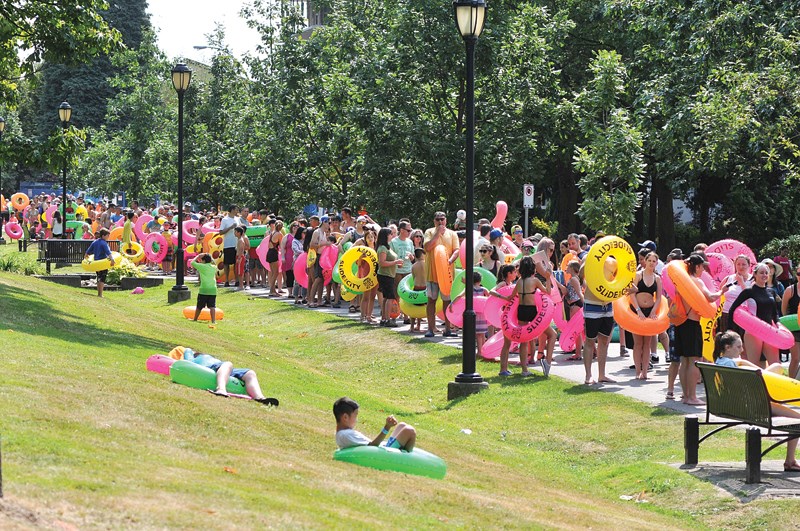It was shoulder-to-shoulder for Slide the City on Lonsdale Avenue this weekend but there was an excess of elbow room in at least one Lower Lonsdale shop.
Business was down by nearly two-thirds at Highwater Tackle, according to owner Dave Steele.
“It frustrates me every year,” Steele said of the waterslide-centric street festival. “You’ve got tax-paying businesses that rely on those prime weekends in the summer to make their money.”
After his business brought in about $11,000 on Aug. 5, business dropped to about $4,000 during Slide the City. His store was empty for several hours during the day, which is part of the most crucial three-month period for his business.
While he supports the event, Steele noted not everyone keeps a wallet in their swimsuit.
“I’m fishing tackle, you don’t have a guy with a float tube saying, ‘Oh jeez, let’s go in and buy something.’”
The event poses a challenge for certain businesses, agreed Lower Lonsdale Business Improvement Area executive director Greg Holmes.
“We’ve said with a lot of the businesses, ‘Listen, your cash register may not ring as much as it does in past weekends,’” he said.
However, the community event draws visitors to Lower Lonsdale who haven’t been there recently. And they come back, he said.
The event attracted between 25,000 and 30,000 attendees, according to City of North Vancouver spokeswoman Connie Rabold.
With most attendees taking transit or being dropped off, the city stopped providing parking lots for the event, Rabold noted.
“We’re delighted that people got our message that it’s a car-free event,” she stated.
The city closes down Lonsdale during the event, restricting passage on several streets but maintaining regular access via Esplanade and Third Street.
Part of the challenge is perception, according to Steele, who said many customers avoid the area because they don’t expect to find parking and are leery about lugging heavy items like downrigger balls back up the hill.
“That’s going to eliminate a pretty good percentage of shoppers,” he said.
At Steele’s behest, the city provided 30-minute parking signs but those limits were “largely abused,” according to Steele.
“People just ignored them because there’s no enforcement,” he said.
The BIA favours greater enforcement, Holmes noted.
For the BIA, the emphasis is on encouraging businesses to get out of the store and onto the street.
“It wasn’t just a matter of standing there saying: ‘Hello, would you like to hear about my business?’ That’s not what people at festivals are looking for. They want to play a game, they want to spin a wheel.”
And while festivals benefit shops that sell coffee or ice cream, there’s a chance for other businesses to think outside the box, according to Holmes, who noted a travel company that erected a photo booth and a clothing store that dished out cotton candy.
“You’ve got to figure out how to get onto the street,” he said. “At the very least, you just control your costs and ride it out as best you can.”
The newly formed BIA will take a larger leadership role in future festivals, according to Holmes.



